A look back at our ancestor’s lifestyle and diets will help you understand why you are suffering from anxiety and depression – and why they didn’t.
Like everyone, our ancestors experienced anxiety and likely bouts of depression. The issue is that generalized anxiety disorder as well as well as depression has and continues to rise at an alarming rate.
Generally speaking, our ancestors did experience anxiety and depression, but not to the disordered extent that many people do today.
What was once necessary and built-in mechanisms to protect us from danger have become a constant for some people.
Anxiety disorder wasn’t even diagnosed until 1980, not so long ago in the scope of medical diagnoses.
While the root cause of anxiety and depression (which are often both present) is different for everyone, there are several dietary factors that contribute to these mental disorders.
Food: Fat, Inflammation, Toxins, Soil Depletion
Our ancestors, whether from one thousand or one hundred years ago, did not fear fat.
The low-fat craze is still alive and well, just take a look around your grocery store. Skim milk, low-fat cheese, and 0% yogurt are easier to get a hold of than their full-fat counterparts.
While our ancestors ate lard, eggs, and meat, many people have moved away from this ancestral diet and instead adopted a more plant-based, high-carb, low-fat diet.

This Low-Fat diet has very real effects on the body and brain.
If you’re not eating fat, and the right fats, the brain suffers. A lack of beneficial omega-3 fatty acids, EPA and DHA, which are especially concentrated in fish oil, has been shown to cause mood disorders.
Sarah Conklin, Ph.D., a postdoctoral scholar in Cardiovascular Behavioral Medicine presented a study that showed low levels of EPA and DHA were related to mood impairment.
We were able to show that individuals who consumed more omega-3 fatty acids in their diets had more gray matter volume in areas of the brain important for regulating mood. These results suggest that these specific fats, certainly not fat in general, may confer a protective effect against depression and other mood-related problems.
And from Dr. Sears,
There are two omega-3 fatty acids in the brain. The first is called docosahexaenoic acid or DHA. This is primarily a structural component for the brain. The other is called eicosapentaenoic acid or EPA. This is the primary anti-inflammatory omega-3 fatty acid for the brain. So if the levels of EPA are low in the blood, they are going to be low in the brain. To further complicate the matter, the lifetime of EPA in the brain is very limited (3,4). This means you have to have a constant supply in the blood stream to keep neuro-inflammation under control.
This “high-grain and low-fat “way of eating also contributes to inflammation.
A high-grain, low-fat diet that employs the use of vegetable oils causes extreme inflammation.
The omega-3 to omega-6 ratio should be about 3:1. Instead, it’s about 1:30 in modern diets.
A lack of beneficial fats, like coconut oil, egg yolks, pastured butter, and avocados only adds to the problem. According to Dr. Emily Deans,
…inflammatory cytokines also interfere with the regulation of another neurotransmitter, glutamate. Glutamate is an excitatory neurotransmitter that, if left to go wild, can pound our NMDA receptors in the brain and wreak major havoc. No one wants overexcited NMDA receptors, and clinical depression is one among many nasty brain issues that can be caused by overexcitement. Astrocytes, little clean-up cells in the brain, are supposed to mop up excess glutamate to keep it from going nutso on the NMDA. Turns out inflammatory cytokines interfere with the clean-up process.
Finally, inflammatory cytokines also push the brain from a general environment of happy “neuroplasticity” (mediated in part by a type of natural brain fertilizer called “BDNF“) towards an environment of neurotoxicity (sounds bad, and it is!).

Inflammation is one of the most damaging conditions for the brain (and well, everything else too!).
It is absolutely necessary to eat the correct fats and quite a bit of them to quell inflammation.
Foods high in EPA and DHA are wild seafood, pastured meat, organ meats, and egg yolks. In Toxic Fat, Dr. Sears discusses the surge in anxiety and depression as linked to an imbalance of AA and EPA.
What causes AA to increase is a combination of increased consumption of vegetable oils rich in omega-6 fatty acids coupled with an increase in the consumption of refined carbohydrates that generate insulin. When excess omega-6 fatty acids interact with increased insulin, you get a surge of AA production. At the same time, our consumption of fish rich in EPA has decreased. The end result is an increasing AA/EPA ratio in the blood, which means a corresponding increase in the same AA/EPA ratio in the brain creating more cellular inflammation.
Food toxins also play a huge role in the onset of anxiety and depression.
Not only do they contribute to inflammation, but they also alter the gut flora.
While we are just beginning to understand the gut-brain connection, we know that whatever is occurring in the gut has a direct impact on the brain. From Harvard Medical School,
The brain has a direct effect on the stomach. For example, the very thought of eating can release the stomach’s juices before food gets there. This connection goes both ways. A troubled intestine can send signals to the brain, just as a troubled brain can send signals to the gut. Therefore, a person’s stomach or intestinal distress can be the cause or the product of anxiety, stress, or depression. That’s because the brain and the gastrointestinal (GI) system are intimately connected — so intimately that they should be viewed as one system. (emphasis mine)
A recent study at UCLA demonstrated that yogurt intake could positively affect brain function. In particular, feelings of anxiety. According to the researchers,
Four-week intake of an FMPP [fermented milk product with probiotic] by healthy women affected activity of brain regions that control central processing of emotion and sensation.
Considering food toxins like GMOs, vegetable oils, high sugar intake, and processed ingredients negatively impact gut flora, it’s important to not only eliminate these ingredients but also take a high quality probiotic.
While our ancestors regularly ate probiotics via fermented foods and soil, the modern diet is severely lacking.
Prior to soil depletion, soil used to be rich in magnesium. Our ancestors had a regular intake of magnesium from the soil as well as bathing in and drinking water rich with it.
Unfortunately, soil and drinking water are no longer rich with magnesium.
Magnesium plays a hugely important role in the body.
Without adequate magnesium, the brain will not properly release serotonin. This leads to both anxiety and depression.
I recommend a transdermal magnesium supplement; I personally use this magnesium oil lotion before bed. It is deeply relaxing and promotes restful sleep.

To mitigate the effects of anxiety and depression, eat as close to nature as possible.
No fad diets, no 100 calorie snack packs, no low-fat crap. Eat real food. My 21 Day Lifestyle Transformation includes meal plans, recipes, and grocery lists to help you overhaul your diet in three weeks.
If you suffer from anxiety and/or depression, or even if you just want to maintain a healthy lifestyle, I suggest avoiding these foods:
- sugar – especially refined sugars including high fructose corn syrup and agave nectar
- unhealthy fats – cottonseed oil, canola oil, soy oil, corn oil, grapeseed oil, sunflower oil, safflower oil
- GMOs
- refined carbohydrates
- wheat, gluten
- inorganic meat and dairy
I also use essential oils to manage my own anxiety, stress, and mood. You can find those here.
Also note that I didn’t even include other factors like sleep, stress, family life, community, etc. All of these are factors for depression and anxiety.
So is our modern day diet responsible for the rise of anxiety and depression?
Today’s society is shying away from good natural, high-fat foods that our ancestors ate and didn’t have a problem with. Similarly, we’re putting foods into our bodies that they wouldn’t have dared touch with a barge pole.
Do you believe that our diets can affect our mental health? I do, I am the living proof. Let me know your opinion about this topic in the comments section!
Sources:
https://www.lef.org/magazine/mag2007/oct2007_report_depression_01.htm
http://www.health.harvard.edu/healthbeat/the-gut-brain-connection#sthash.NqCugUG8.dpuf
http://www.gastrojournal.org/article/S0016-5085(13)00292-8/abstract
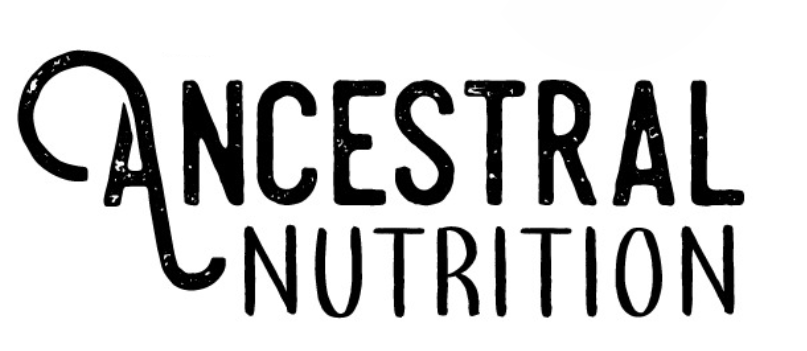
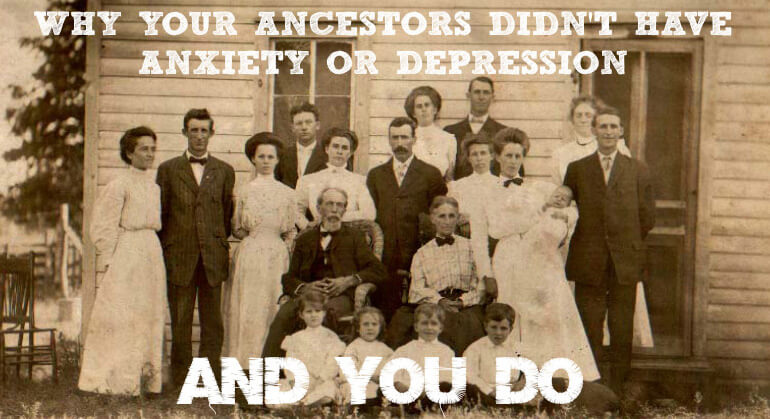
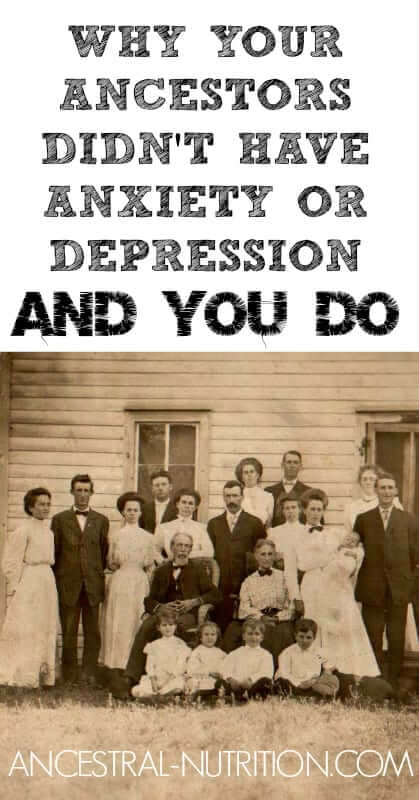
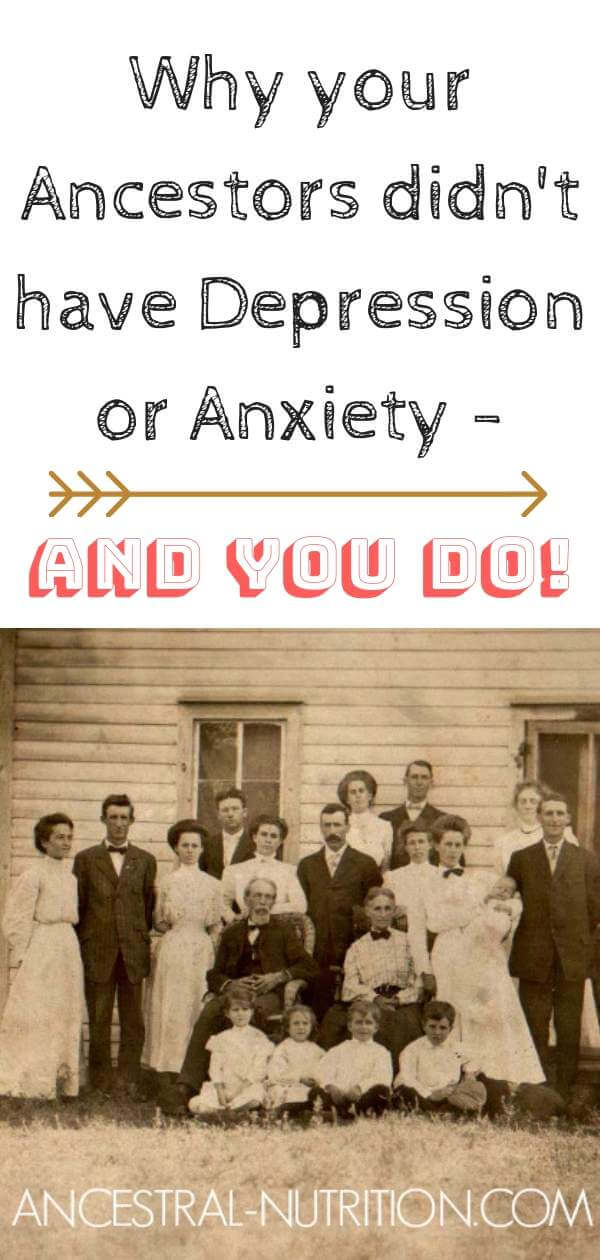
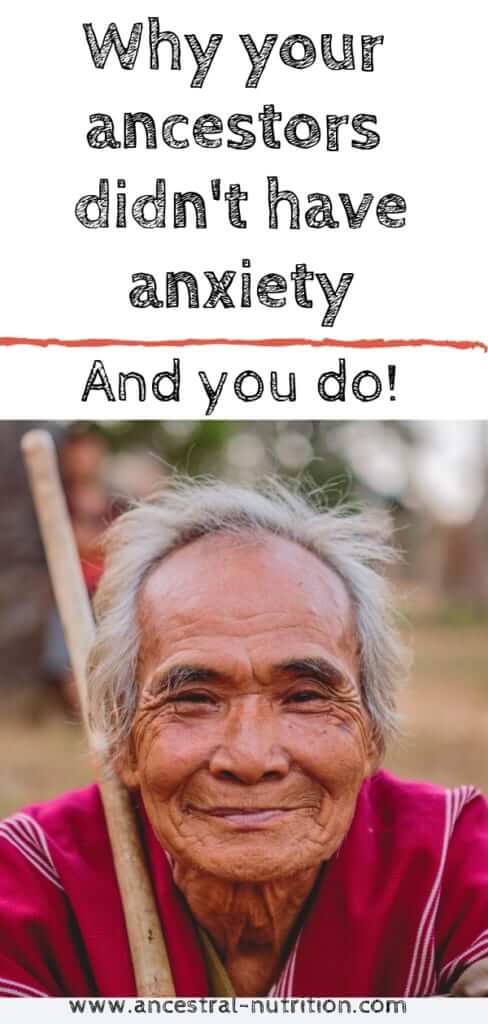
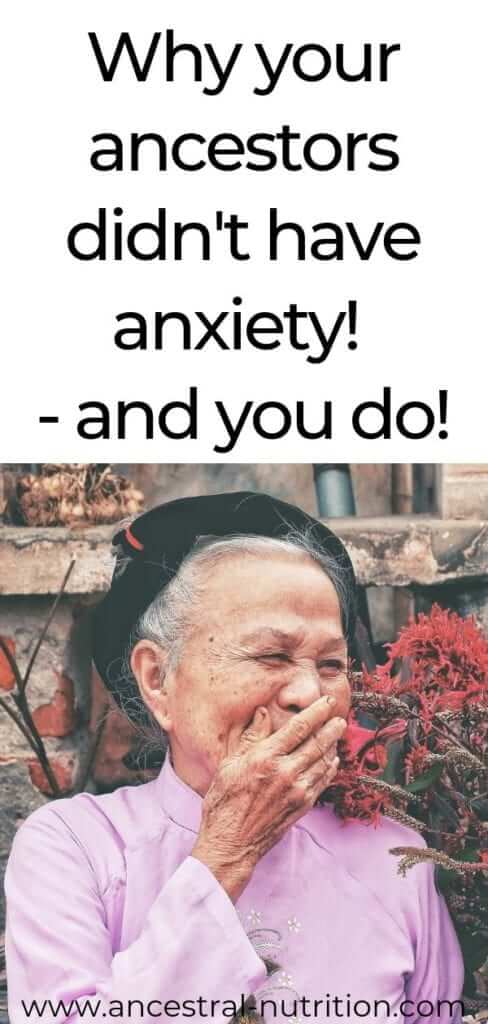

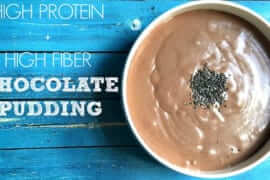

75 Comments
I was excited to read this article, Dani! I have suffered with anxiety/panic disorder for almost 17 years (since I was 12). About 2 years ago I adopted a paleo lifestyle after attempting vegetarianism/veganism. I was so thin, so weak, so sick, so anxious, had acne, and my digestion was horrible. I relied on a bunch of grains which completely ruined me.
I’m so proud to say that after incorporating tons of fat (grass-fed butter, coconut oil/milk, avocados, eggs, and pastured meats) as well as supplementing with magnesium and working on my sleep and stress, I have ditched my anxiety (and acne, improved digestion, and gained healthy weight)! I occasionally have a very mild panic attack but I can usually narrow it down to what I have done or not done. I’ve done this all without the help of a medical doctor. When I did go to the doctor, all she wanted to do was shove a pill down my throat and not address my lifestyle.
Even though I have my degree in nutrition, I never learned about traditional foods. Everything was low-fat, high-carb, FDA, my pyramid crap-ola. My health has been saved by my own research AFTER graduation.
Love your articles!
It is insane how much your story matches mine! Literally everything you said is my story to a T.
So glad you were able to overcome your anxiety as well!
Just a note on anxiety disorder diagnosis: it was diagnosed, treated and researched long before 1980. In the early 70’s I came across a research paper from 1967 that focused on a link between panic attacks and high blood levels of lactic acid. That paper cited research from earlier studies as far back as the 1950’s. I’ll try to locate specifics and post it here ASAP.
You should check out John Gray’s web site … he has short videos that are most helpful one dealing with anxiety/ depressions/ panic attacks. Here’s the link. I found this to be incredibly helpful: http://www.marsvenus.com/p/lithium-orotate
“Anxiety disorder wasn’t even diagnosed until 1980, not so long ago in the scope of medical diagnoses. ”
Exactly. That’s why my ancestors didn’t have anxiety or depression. Because they did, but mental health science wasn’t a field yet. Now that it is, of course, people can cherry pick the science to sell diet plans.
And GMOs are not a food toxin. They’re food. If anything genetically modified by humans is a toxin, then all of agriculture modified through selective breeding throughout history is toxic.
Maybe you somehow missed the first paragraph, let me reiterate:
“Like everyone, our ancestors experienced anxiety and likely bouts of depression; the issue is that generalized anxiety disorder as well as well as depression has and continues to rise at an alarming rate.”
GMOs are not toxic? You may want to do some more research on that, buddy: https://ancestral-nutrition.com/top-10-gmos/
And you clearly need to do more research on the difference between genetic modification and hybridization. Here’s an article to help you out: http://www.foodrenegade.com/hybrid-seeds-vs-gmos/
Right on, girl!! So happy for this! And thankful you know your stuff and aren’t going to be intimidated or back down from people who try to sell us garbage. I have brought myself out of a wheelchair and from a life that bordered on death for many years by ditching artificial CRAP in my food as well as cleaning and personal care products. I’m not “there” yet but I’m so much better than I was and my quality of life is at least a LIFE now!!!! Thank you for all of this…I will be following. Sending you love and hugs for what you’re doing. xoxo
That is amazing! And thank you so much!
Growth hormone in milk has not been linked to an increase in gastrointestinal cancer. This misinterpretation has arisen due to the primary paper Samual Epstein based his research on suggested excess growth hormones could be liked to gastrointestinal cancer (this makes sense as cancer is inherently a growth disorder). However consumption of growth hormones was not included in this article, and it involved human growth hormones, not bovine, which are unable to bond to human receptors. It should also be noted that cows treated with growth hormone are not themselves GMOs.
The French article regarding the effects of Roundup and a GMO diet failed to include controls without Roundup or GMOs, and as such cannot be compared to a diet lacking GMOs. The paper focused on the effects of a diet containing Roundup itself, not the effects of GMOs on cancer rates.
The other IJBS paper, published by the same group, acknowledges they failed to include proper controls, and even go so far as to say the data may only suggest more study need be conducted, and in itself is inconclusive.
The IAASTD report suggests the loss in crop yield is due to lack of proper crop rotation, decreasing soil quality and having nothing to do with Roundup application.
Finally, your link regarding the USDA data does not lead to a USDA report, but in fact leads to a http://www.NonGMOProject.org article. Certainly a biased source, and misleading regarding the origin of the information.
“Like everyone, our ancestors experienced anxiety and likely bouts of depression; the issue is that generalized anxiety disorder as well as well as depression has and continues to rise at an alarming rate.”
Thisi sn’t completely true, and I have a professional and undergrad degree in psychology, am a qualified psychotherapist, and have done a lot of research on the history of mental health, nutrition, ancestral diets, etc. Which I mention so that I”m not dismissed with having no credibility. And to begin, as we learn more about depression and anxiety, since the DSM (now in version V) hasn’t been around that long, we see more cases as a natural progression for a new form of science, comparitivly. So the longer it’s been around, the more that seeing a therapist is accepted, the more that we talk about mental illness and destigmatize it, the more you will see cases rise because people are finally opening up about it, which gives us a better sense of their rates. To make a comparison, rape is still extremely stigmatized. Because of this and the history of “not talking about it, it was the womans fault, etc.” 60% of victims STILL do not report it. So as it becomes less stigmatized and we see more reportings, the statistics will rise. This does NOT correleate or mean that more rape is occurring, it means that more is being reported. Statistics 101: Correlation does not = causation.
First off, some mental illnesses have genetic components that often skip generations and those genes have been passed down, down, down. Second, mental health wasn’t even recognized until more recently. Shit, being homosexual was sitll seen as an illness until the early 80s. A lot of symptoms of depression and anxiety were named and explained differently because they didn’t have the knowledge or the know how. The ancient greeks even documented these cases and created the 4 humors, which were the cause and treatment for everything. At the turn of the century, women who showed signs of what would now be diagnosed as depresseion would be put on milk diets or could be institutionalized by their husband just by him saying she’s unstable. Insane asylum’s were created on the outskirts of community/castle walls hundreds of years ago to keep sufferers out of sight, out of mind, and as a threat that if you don’t follow suit, you could end up there. So there’s a long, long history of mental illness throughout history. And yes, I did read the medical research you provided, but titling something as “why your Ancestors Didn’t Have Anxiety Or Depression And You Do” is incredibly misleading and incorrect on top. One of the first things we ask patients is familial history and for good reason. MI’s are part genetics, part environment. You may have a predispositon, but you may not experience anything in your life that triggers it. Then again, you might. And yes, eating a whole foods diet is a great protective factor against mental illness like depression and anxiety and can AID in treatment, but it’s in no way the end all be all and you shouldn’t use nutrition to solely treat Depression or Anxiety, as it’s not going to help what triggered it. There are a million outside factors that can form a perfect storm to create depressive symptoms and/or anxiety, which are typically symptoms of something else (such as how anger is a secondary emotiona) that needs to be uncovered and healed. There are people who have suicide that runs in their families. SO don’t solely look at statistics of rising rates of depression and connect it in a bias way, look at it holistically and consider the history of how MI’s been looked at, rates of report, rates of seekign treatment, etc.
What are GMOs?
GMOs, or “genetically modified organisms,” are plants or animals that have been genetically engineered with DNA from bacteria, viruses or other plants and animals. These experimental combinations of genes from different species cannot occur in nature or in traditional crossbreeding.
Virtually all commercial GMOs are engineered to withstand direct application of herbicide and/or to produce an insecticide.
or sometime to insert anti-freeze genes in tomatoes with potentially devastating health consequences
http://www.huffingtonpost.com/jeffrey-smith/throwing-biotech-lies-at_b_803139.html
The paper discussed in the Jeffrey Smith article was retracted because it was so poorly conducted. It had too few animals, a lack of proper controls, and the treatment of animals varied between conditions. I recommend you read the original research articles with a critical and open mind, as Jeffery Smith is well known to misquote and over interpret results.
“c”
your comment “Because they did, but mental health science wasn’t a field yet.” is just not true. I’d urge you to have a look at a book published in 1937
The mentally ill in America, by Albert Deutsch, Columbia University press
https://archive.org/stream/mentallyilliname029063mbp/mentallyilliname029063mbp_djvu.txt
with records dating back to the early 1800s.
there has been significant studies made on GMOs dangers, but you might be closer to the truth than you think when you say “all of agriculture modified through selective breeding throughout history is toxic”. See for instance
http://www.nytimes.com/2013/05/26/opinion/sunday/breeding-the-nutrition-out-of-our-food.html
They definitely did have a twisted view on mental illness back then, though, even though the field of mental health did exist. Women were diagnosed with hysteria and put in asylums for ridiculous reasons.
A great example is Elizabeth Packard; she was sent by her husband to an asylum because she disagreed with his opinions. When she was committed, it was completely legal to commit a wife by her husband without a public hearing or consent. Note that it didn’t go both ways. People may have had a significant amount of anxiety/depression back then, but were misdiagnosed. Just something to keep in mind when looking at the rates of anxiety/depression now vs then.
https://en.wikipedia.org/wiki/Elizabeth_Packard
I completely agree with our food contributing to anxiety and depression and that having a healthier diet will help alleviate symptoms (I’ve definitely experienced this personally), but I think it’s also important to keep in mind what the world of mental health was like back then.
https://en.wikipedia.org/wiki/Female_hysteria
http://www.lostateminor.com/2013/11/01/egotism-laziness-female-disease-among-reasons-to-be-admitted-to-1800s-insane-asylum/
Everyone seems to be unclear on what an ancestor is and what I’m referring to. It’s not this century or the last. It’s remote relatives, hundreds and hundreds, even thousands of years ago.
Your article was very interesting, and I agree with much of it. I am not a professional in any field relating to this topic, nor am I affiliated with any food industry. It seems to me if we eat what our grandparents and great grandparents ate, (mineral soil depletion didn’t become a significant problem until the 1950’s, if I’m not mistaken), we would all live longer, healthier lives. But, why the ‘demonization’ of sugar? True, our grandparents did not eat sugar in the amounts that modern folks do, soda pop was consumed rarely, if ever, and the same was true of candy bars, both of which are filled with artificial additives. But, they did consume sugar, and if you check the cookbooks of the era, they reflect that. Cakes, cookies, ice cream, were consumed, if not on a weekly basis, (depending, of course, upon their economic status), then on a monthly basis, with no apparent ill effects. ‘Fudge parties’, were quite the rage at the turn of the century, and lingered for a decade or two. America seems to have produced the ‘new religion’ of food fads, and, as extremism is the hallmark of any fad, perhaps attitudes of moderation are called for?
Those are not our ancestors. Grandparents are not ancestors. When I refer to ancestors, I’m referencing the diets of humans thousands of years ago.
Our ancestors from a thousand years ago… like during the dark ages or perhaps even later. Ok, tell me who conduct the research and mental health evaluations on them. What standards did they apply in determining their mental health status. One last thing, did they take into account the largest and most insidious culprit of problems with mental health. Such as nutritional deficiencies and in particular the one that 92% of Vegans suffer from… a complete lack of B12 vitamin need to maintain mental health by keeping your brain cells alive. I’m sorry but your insistence no using examples from times that, I’m rather sure you did not witness or have peer-reviewed sources to back you up. Is something you need to work out and get better at. Do you have any Idea how easy it is to find sources to support your ideas no matter what they are. All ya gotta do is know where to look and how to use it to support what you have to say. True or not, is not the point, just proving it is what it’s all about.
Mental illness is mentioned in biblical times. They thought people were possessed by evil spirits.
Unfortunately people can be mislead that GMOs and other insults and poisons to our food and environment are “not that bad”. That’s how so much damage has been caused to the point that it is almost beyond repair.
This article is so true. People have to care and make small changes in their lives to effect BIG change in the world. Just look at what happened after years and years of work to liberate the Orcas at SeaWorld. In a few more decades they will all be wild again. Maybe we can have chemical free food someday if we keep asking for it.
Exactly what I was thinking. Selective breeding of plant species is also considered a gmo. If we didn’t have the breeding programs we do we wouldn’t have the delicious food we eat today. Science is not always a monster. The gmo’s you are speaking of are the dangerous and toxic variety, like being able to withstand certain chemicals, but you need to understand that all gmo’s are not created equal and should not be placed under the same umbrella.
No, that’s hybridization and there’s a huge difference between that and genetic modification. They are two separate and very different things.
Great article! So many problems today are caused by our poor diet as a country.
Just wanted to point out a very minor thing, you said, “A recent study at UCLA demonstrated that yogurt intake could positively effect brain function, particularly feelings of anxiety.”
It’s “affect” not “effect” in this instance.
I really appreciated how well-researched your article was, and didn’t want any grammatical errors to take away from it 🙂
Thanks for the catch!
Might you have meant to say “The omega-3 to omega-6 ratio is about 1:30 in modern diets” rather than 30:1?
Yes! Thank you!
Great article. Thank YOU.
I love this post as I too have found that changing my diet has helped with my own anxiety and post natal depression. Real food is awesome and so is your blog!
Just as a side note, you should check out the history of the insane asylums in the United States. We are blessed to live in a time that is more understanding of mental health issues. If I had lived back then I would have done everything possible to hide symptoms that would resemble anxiety or depression. Anyone who was not ‘normal’ could be put in the asylums, often by their own families. Thank goodness we live a time where we can talk about health issues like this without the fear of such a place.
http://www.dailymail.co.uk/home/you/article-2141741/Sent-asylum-The-Victorian-women-locked-suffering-stress-post-natal-depression-anxiety.html
http://news.discovery.com/human/life/slideshow-history-mental-asylum.htm
http://content.healthaffairs.org/content/11/3/7.full.pdf
Thank you! And very interesting links. I’m definitely glad we live in a time when people aren’t mindlessly thrown into asylums; it’s crazy to think how recently that was commonplace.
Speaking of toxic foods, inflammation and healthy fats for brain development, are you aware that there is an Enfamil formula ad front and center on your page? I’m not sure how these things work and I’m sure you don’t select the individual ads that appear here, but you ought to somehow be able to control them so the don’t market products that completely contradict your useful information.
I had no idea, I’ll have to try to block that one. Thanks for letting me know!
Aww very pretty :), I take it your eating all the healthy stuff.
Thanks for the great article, I found it on pinterest.
Thank you for the very sweet comment!
Sorry but yes are ancestors had mental illnesses they were just locked away in asylums never to be heard of again and there was no internet social media psychologists etc to blast it everywhere. I suffer with anxiety and have since I was 11. My mom her dad his mom her mom…..and farther back had mental illness. I know its worse because of internet hypochondria media etc…but our ancestors definitely had mental illness and lots of it.
You don’t understand the article. I’m not talking about your great grandmother, I’m talking about our ancestors from hundred and even thousands of years ago. Again, anxiety wasn’t even diagnosed until the 80s. I think I also made it pretty clear that anxiety and depression have spiked in the last 10-15 years.
Great article, I believe it very much so and I am reaping the benefits of changing my diet and eating an organic paleo diet. My depression and anxiety levels have greatly improved.
That’s awesome!
I do understand your article. However one of the first people to live on this planet killed his brother (Cain and able) I don’t know what you would call that but I call that mental illness. King henry v111 was a mad man. If you read history mental illness was there. But u r right in stating it was not “officially diagnosed” until the 80s. Before people were just labeled “crazy, weird, disturbed, insane” whatever. I agree wholeheartedly our nutrition isn’t what it used to be and it never will be as the end times get closer. But although I appreciate your pass on for health your articles are a bit far fetched at times.
Didn’t henry go mad because he had a std. As for the first 2 brothers, that was just plain ole greed and jealousy, as far as I am concerned. I am not discounting your beliefs, but there is a difference between real mental health issues and excuses for poor behaviours
Henry the VIII was believed to have porphyria, a genetic disorder.
I also believe anxiety has increased because of media social media internet etc. We constantly know every horrible thing happening at every corner of the world and many people feed off of this, subscribe to it so they have constant updates all day long. Less time in nature more time in everyone’s business. Hundreds and thousdands of years ago no one knew what was happening 10 miles from where they lived let alone Israel and Africa! Society is choosing a path of self destruction and without Jesus anxiety will continue to hang around.
Yikes I don’t mean to sound like a troll! I truly appreciate your passion for health and reading your history of anxiety (I battle it too…awful at times) I know your intentions are good. 🙂
I was believing everything you s aid until you said anxiety was labeled until 1980. I suffered with my first bout with in 1977, went to Dr. and was asked “is anything in my life bothering me, etc” same kind of questions they will ask you now to see if your overstressed or something, i suggest you do some more research.
I didn’t say anxiety didn’t exist until 1980, I said it wasn’t diagnosed until 1980. It’s deeply offensive when people tell me I need to do more research simply because they haven’t done their own. I provide facts: http://www.ncbi.nlm.nih.gov/pubmed/11414550
Also, I’m unclear as to what you mean by “I was believing everything you s aid until you said anxiety was labeled until 1980.” That was literally one of my first points and the opening to this article. I didn’t even provide any research prior to this.
Interesting take, Dani. Nice article.
Thank you!
Unless you’re referring specifically to the standard American diet of French fries, cheeseburgers, and soft drinks, I believe our incredibly sedentary lifestyles has more to do with depression than a lack of fat in our diets. Our ancestors died between the ages of 35 and 55, and had a lot of heart and cholesterol issues. Furthermore, based on the way our hands, teeth, and digestive tracts are made, we are best suited to a vegan diet.
None of what you said is accurate.
https://ancestral-nutrition.com/dont-recommend-vegan-diet/
I don’t know about our ancestors not having depression or anxiety. My grandmother was born in 1914 and suffered from severe depression all of her life. (It wasn’t diagnosed until a few years before she died, which was unfortunate.)
She was a farmer’s wife and they ate eggs, meat, lard, full-fat milk from grass-fed cows, 100% real food grown on the farm. Judging from family stories, she inherited her depression from her father, and I know that it has been passed down to her descendants, so I would say that it’s an inheritable family trait.
A grandmother is not an ancestor. An ancestor is a family member even further remote than a great-grandparent. When I refer to ancestors I’m typically talking about hundreds and hundreds to thousands and thousand of years ago.
I love the article! I truly believe that a lot of how our bodies function, our moods and how our bodies “feel” overall (not feelings…) is directly related to the quality, combination and frequency with which we fuel it. If you put crap in, you get a crapy output. Shop the perimeter of the store, people! Don’t eat processed junk! If you don’t know what is in it, how can your cells know what to do with it or how to process it? Now… I also believe everything thing should be done in moderation. If you want to eat a decadent junky, empty-calorie treat once in a while, do it. But just not every day, or an excessive amount. Eat one delicious dark chocolate truffle instead of a king-sized candy bar every day. And don’t even get me started on soft drinks, sports/energy drinks and labels that imply “healthy” but are really loaded with chemicals, unnecessary calories and sugar! It’s all about profit, y’all!
Obviously, people have nothing better to do than read articles just to attack others. I think you have valid points and you provided resources to look at. Why was it so important for so many people to contradict you, after you had explained and explained. I believe this is one (notice one) reason for increase in mental problems, along with the other reasons cited. It ALL ties in. What I mean is the world has gotten smaller and smaller. We see and know more about people than we ever have in other places besides our own small towns. And if we lived on farms it was even more limited access. Our food and additives are actually poisoning us. This person is trying to get you to look at something you might look into. There are more stressors than ever. And we were not aware of how many people were affected by anxiety and depression in our ancestors but I believe there IS a correlation to our diets of today. If you do not agree take it with a grain of salt and move on instead of making such a big deal out of proving someone wrong. Great info but it could be given without such animosity.
The ancestry photo that you have used is very interesting; as it resembles my family ancestors. I have a photo that goes with it too! I would be very interested to know more about the photo! I saw this as a post on Pinterest and was so surprised to see it! I had to contact you about it. I can also share the twin picture of my family ancestors!
I actually purchased it via a stock photo site, wish there was a cooler story behind where I got it!
I enjoyed this article. I dont feel though that a particular diet will work for everybody. People are different and different things will work for different people.
The science in regards to food (GMO’s) will always have critics on either side, forever. Its just one of those things.
What id like to see done differently next time is some in text references where your statments come from or are they just opinion.
Cheers
Jake
There are links to all of that information directly in the article. It’s not just my opinion, it’s back up by scientific sources.
Great blog. I keep telling my hubby his stomach and all other health issues is the food he eats. It is drowning in gmo’s. We do not eat the same at any given meal. When he went overseas just a few months ago I had to decide what to do with all his food. Well slap me in the head I started to eat it so not to waste and throwing out what I knew was gmo. Needless to say I gained 38 lbs in just over a month and have the same protruding hard gut he has been fighting and inflammation in the limbs among the many more issues. I did more research on gmo and found 90% of what I kept had gmo in them. So everything has now been discarded. Three days after going through the gmo list of foods and brands that have them and tossing them I have lost weight and my stomach is going down. The foods are addicting for sure. They spend millions and millions of dollars to get the taste just right. Then they come out with ads like “You just can’t have one”. He who controls the food controls the people. We are what we eat for sure.
Hi Dani, I just want to say that I’ve been vegan for 5 years and in my teens I suffered from anxiety and depression, since I became vegan my life changed: I felt with more energy than ever, i felt happy and healthy and I didn’t felt anxious,anymore, also I became more aware of my body and depression was gone, plus I did’t have to kill animals.
So I know maybe a vegan diet is hard to follow for some people but also your diet it’s not what I felt was right to my body. It come to my mind how dairy and meat has a lot of hormones and toxins like that, maybe that’s the reason why our ancestors ate meat and were healthy. Anyways, it’s always ok to read some other points of view but I will stay vegan because that’s what has worked for me.
Very interesting article! I haven’t read enough on this topic to have much opinion about certain parts that some people find controversial (especially the issue of gluten, which I’m on the fence about) but I know one thing for a fact: We definitely need more healthy fats in our diets, and definitely more WHOLE foods rather than so much processed stuff. Omega 3, etc. has also been indicated (if not actually proven, I can’t remember) to help with ADHD (which I happen to have) and a whole lot of other things.
One thing I feel I should point out, regarding many of the comments… I can’t speak for anyone else, but the picture at the top of the page may have been confusing to some people as far as what you meant by “ancestors,” since it’s such a historically recent photo. When I see a photo like that, with that word associated with it, I’m definitely going to think of more recent ancestors rather than the ancient ones lol. Just a thought. 🙂
I believe this is spot on as everyone ate beef stew and fish jerky etc.. Alcoholics or people with poor digestion back in the day probably suffered from anxiety yet they had no reason why so they called them mad. Today people just take a pill and don’t understand that processed food is probably the culprit to a poor mental state even though they have modern medicine to give them shots to cure infections and surgery’s to heal injuries.
Pingback: Just another WordPress site
I agree, our ancestors did not have to health issues to the extent that we do today, and in some cases (ADD / ADHD) didn’t even exist. I am a nurse, and know that there are several things that they say not to eat, or to limit (ie fat) but yet there are other areas of your health that this will have a adverse reaction. Through the years you hear — don’t eat ____, but a couple years later they now discover they were wrong because not having ____ causes another issue. Some of the health hazards relating to foods in my opinion have to do with the way things are processed today. What I would really like to know is using fat as an example – to much fat increases chance of cardiovascular issues, but basically its the fat that keeps the brains neurotransmitters connecting, so I wander, what is it that keeps fat regulated? Is it that there may be another food we have yet to learn that if you eat fat, then make sure you eat this as well to keep everything in balance?
Pingback: My Starseed
There are those who for years have said:
there are too many people in the world we need to get rid of 30% of them . so what better way , than to change our food. to where people die , and they make money.
Pingback: ARTIFICIAL LOVE
Pingback: LowlySacker
Anxiety & depression are caused by eating too many calories or eating too frequently, not by vegan/vegetarian foods. Eating too much sugar, carbs and/or gluten increases anxiety and depression, mainly because of withdrawals, but also reduces gut health. And foods with dairy proteins are worst of the worst.
If you eat 3 (breakfast/lunch/dinner); eat a small breakfast, small lunch and a med dinner. Avoid snacking between meals (zero calories between meals).
If you eat 2 meals; eat a small lunch with a med dinner. I feel my body heals faster from cuts/bruises on 2 meals. Eating 2 meals is hard for a few weeks, but I notice my stomach (especially lower belly) is shrinking, steady energy whole day, overall body looks muscular, better eye health (no pressure or blurriness), no loud stomach rumblings (which was so embarrassing in school). At lunch I get super hungry so it’s important to eat small lunch and don’t over indulge. Again no snacking between meals.
Of course if you workout, you increase meal portion size, but still not snacking between meals.
This is not accurate or backed by science. But I’m glad it’s working for you!
Exactly. This article is twister. It first neglects a millennia of history talking about melancholy and hysteria (doctors had different terminology) and then goes off on plant foods when it’s actually saturated fats and fast foods, the high level of acidic foods that cause inflammation and higher rates of physical and mental health issues today. The modern meat centric diet is destroying our planet but also multiplying exponentially the rates of heart disease and cancer. This is a ridiculous article and the people who like it are hopeless.
How can anxiety not be “first diagnosed” till 1980 when anxiety and depression was being treated in the 18th century?
Don’t get me wrong, this is a good article. But it’s a bit misleading in the actual information with anxiety and depressions timeline.
Anxiety disorders didn’t exist in the past not because people ate more meat and less plants but because they weren’t whiny, self-absorbed assholes sitting on their asses all day. Eating plants and high carb diets is more comparable to an “ancestral diet” than all the fast food people eat now, that is actually destroying our brains. And plant based diets have omega fatty acids (seafood are just taxi drivers for these nutrients found from plants) and fat. Healthy fats that nourish Grey matter. So take your meat industry funded article and f#^% off back to McDonald’s.
This is absolute bullshit. My mother is clinically depressed, as was her mother, as was her father, all the way back for at least a couple hundred years. My ancestors DEFINITELY had anxiety and depression, no matter how they ate. And despite the primitive understanding of mental health at the time and the stigma against mental illness, they were actually crazy enough that it was apparent even before the precise diagnoses of today (lots of “nervous disorders” and “hysteria” and stuff).
Anyway, a good diet for the sake of eating well is fine, but none of this has anything to do with mental health and this is unscientific bullshit.
Actually we know that diet, gut health and nutrient deficiencies play a huge role in mental health. That’s a simple fact and is backed up by my years of research and the research included in this article on various parts of this website.
There is no genetic link (that has been discovered at least) for depression and anxiety. It does not exist. While depression and anxiety may have been handed down through behavior in your family, it is not simply genetic. Even if there was an established genetic factor, that does not mean you will have anxiety or that future generations couldn’t avoid it. We know that genetic play a very little role in disease outcome and that lifestyle factors, like diet, are responsible for genetic expression.
I know you’re emotionally tied to this, but you have the power to change and stop the cycle of depression and anxiety. It’s totally up to you, and proper diet and lifestyle factors will make a profound difference.
I came across this and decided to post a comment. I have an anxiety disorder and irritable bowel syndrome and I can say 100% that the gut and brain go hand in hand. If my anxiety has spiraled so will my IBS, if my IBS has spiraled so will my anxiety. The brain 100% needs the right kind of fats, that is why doctors so stress it for children, but it shouldn’t stop at adulthood. The more organic and natural foods I eat, the better overall my wellbeing is. An enormous difference. Genetics and lifestyle play a huge part of anxiety and depression for sure, it is in my family, but we have the power to change our lifestyle choices, not our genetics. It will never go away, and as time goes on it will be recognized more and more than in the past, but it can be stabilized with a nutrition and exercise. I also workout and exercise on top of food choice and it has incredible impact on my mental health. My doctor stressed that before medication.
Yes! So glad your doctor stressed diet and lifestyle.